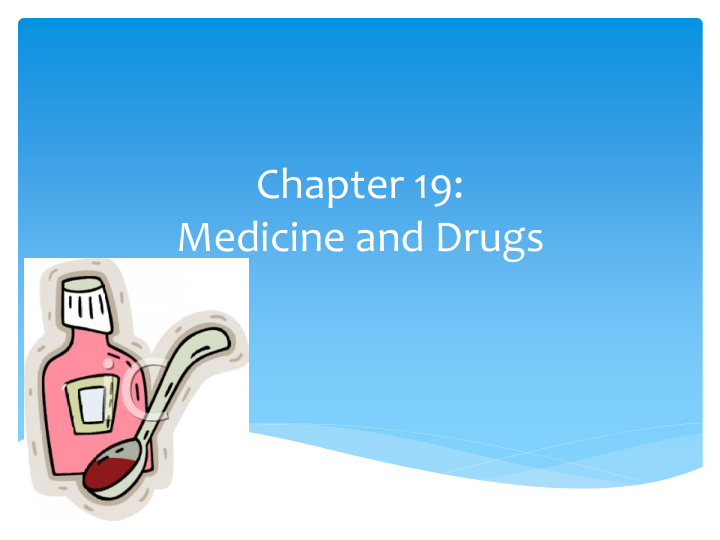



Chapter 19: Medicine and Drugs
Types of Medicines People use medicines to help restore their health when they are ill Medicines – are drugs that are used to treat or prevent disease or other conditions Drugs – are substance other than food that change the structure or function of the body or mind.
4 Categories Medicines that help prevent disease Medicines that fight pathogens Medicines that relieve pain and other symptoms Medicines that manage chronic conditions, help maintain or restore health, and regulate body’s systems
Preventing Disease Vaccines Contain weakened or dead pathogens that cause the disease When injected into the body, the vaccine produces antibodies that fight those pathogens. The protection from some vaccines fade over time Antitoxins Also neutralize the effects of toxins. Produced by injecting animals with safe amounts of a specific toxin. This stimulates the animals immune system to produce antibodies. These antibodies are then used to make an antitoxin.
Fighting Pathogens Antibiotics A class of drug that destroy disease-causing microorganisms called bacteria Work by killing harmful bacteria or preventing backing from reproducing Antivirals and Antifungals Antiviral do not cure illnesses caused by viruses, but treat viral illness Antifungal can suppress or kill fungus cells
Relieving Pain Analgesics Also known as pain relievers Effects include upset stomach, dizziness, and ringing in ears Acetaminophen is the recommended analgesic for children Pain Reliever Dependence Certain types of medicines that relieve pain can be addictive These medicines, usually called narcotics, require a doctor’s prescription. Can become physically or psychologically dependent on them.
Managing Chronic Conditions Allergy Medicines Body-Regulating Medicines Example: Insulin, Inhaler during asthma, cardiovascular medicines Antidepressant and Antipsychotic Medicine Medicines can help regulate brain chemistry or stabilize moods, used in treatment of mood disorders, depression, and schizophrenia. Cancer Treatment Medicine
Taking Medications Oral – taken by mouth Topical – applied to the skin Inhaled – delivered in a fine mist or powder Injected – delivered through a shot, directly into the blood stream. However you take medicine, it is always important to follow the directions on the medicine label.
Reactions to Medicines Side Effects are reactions to medicine other than the one intended Some side effects may be mild, such as drowsiness, but other may be more severe, and can even cause death.
Medicine Interactions Additive Interaction When medicines work together in a positive way Synergistic Effect The interaction of two or more medicines that result in a greater effect than when each is taken alone Antagonistic Interaction The effects of one medicine is canceled or reduced when taken with another medicine.
Tolerance Withdrawal The body becomes used to When a person stops using a the effects of a medicine. medicine on which he/she has The body requires become physiologically dependent. increasing larger doses to Symptoms can include produce the same effect. Nervousness Sometimes a person will Insomnia experience “reverse Severe Headaches Vomiting tolerance”. In this condition, Chills the body requires less Cramps medicine. Gradually ease in time
Prescription vs. OTC Medicines that are dispensed only with the written approval OTC (Over the Counter) of a licensed physician or are medicines you can nurse-practitioner. buy without a A licensed pharmacist dispenses prescription. theses medicines. Distribution of some OTC Only given specific amount of medicines is controlled, medicine, if more is needed such as cold medicines you need to speak with health that contain care provider to approve a pseudoephedrine are refill. kept behind the pharmacy counter.
Medicine Label Active Ingredients Inactive Ingredients Uses Warnings Expiration Date Purpose Other Information and Directions FOR DESCRIPTIONS SEE PAGE 532
Medicine Label
Medicine Abuse Failing to follow the instructions Giving prescription to medicine to someone who it was not prescribed Taking too much or too little Taking a medicine longer or shorter than prescribed Discontinuing medicine without informing your health care provider Mixing medicines without knowledge or approval of your health care provider.
Medicine Abuse Medicine Abuse is intentionally taking medications for nonmedical reasons 96% of teens using medications correctly Some think that prescriptions or OTC medicines are safer than illegal drugs, abusing any medicine is dangerous and illegal. Drug Overdose is a strong, sometimes fatal reaction to taking a large amount of a drug. Misusing medicines can also lead to addiction. Never use a medicine other than how it was prescribed or intended.
Recommend
More recommend